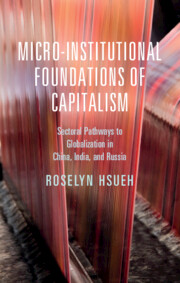Book contents
- Micro-institutional Foundations of Capitalism
- Micro-institutional Foundations of Capitalism
- Copyright page
- Dedication
- Contents
- Figures
- Tables
- Acknowledgments
- Part I Politics of Market Governance
- 1 Understanding Varieties of Market Governance in the Age of Globalization
- 2 Perceived Strategic Value and Sectoral Structures and Organization of Institutions
- Part II Nations and Sectors: Patterns of Market Governance
- Part III National Configurations of Sectoral Models
- Bibliography
- Index
2 - Perceived Strategic Value and Sectoral Structures and Organization of Institutions
from Part I - Politics of Market Governance
Published online by Cambridge University Press: 16 June 2022
- Micro-institutional Foundations of Capitalism
- Micro-institutional Foundations of Capitalism
- Copyright page
- Dedication
- Contents
- Figures
- Tables
- Acknowledgments
- Part I Politics of Market Governance
- 1 Understanding Varieties of Market Governance in the Age of Globalization
- 2 Perceived Strategic Value and Sectoral Structures and Organization of Institutions
- Part II Nations and Sectors: Patterns of Market Governance
- Part III National Configurations of Sectoral Models
- Bibliography
- Index
Summary
The Strategic Value Framework introduced in this chapter offers a unified explanation, linking macro- and micro-sectoral-level changes and continuities, of what appears to be contradictory and irreconcilable forces at work within globalizing countries. It first identifies historically and institutionally rooted values, objective and intersubjective in nature, which arise from state elite responses to political and economic pressures internal and external in nature experienced during significant moments of national consolidation. The perceived strategic value orientation evolves and transforms overtime; and interacts with sectoral structures and organization of institutions. The resultant dominant patterns of market governance vary by country and sector within country and filter the relative impacts of an open economy, global norms and international organizations, resource and factor endowments, regime type and political institutions, and national characteristics and domestic structures. The Strategic Value Framework is tested and substantiated with a multilevel comparative case research design, which systematically conducts across case and within case analysis at (time, country, sector, and company). The case studies leverage historical process-tracing and triangulation of qualitative and quantitative data, including in-depth interviews with state, subnational government, business, and industry stakeholders and primary and secondary documentation collected during extensive fieldwork.
Keywords
- Type
- Chapter
- Information
- Micro-institutional Foundations of Capitalism , pp. 31 - 58Publisher: Cambridge University PressPrint publication year: 2022

